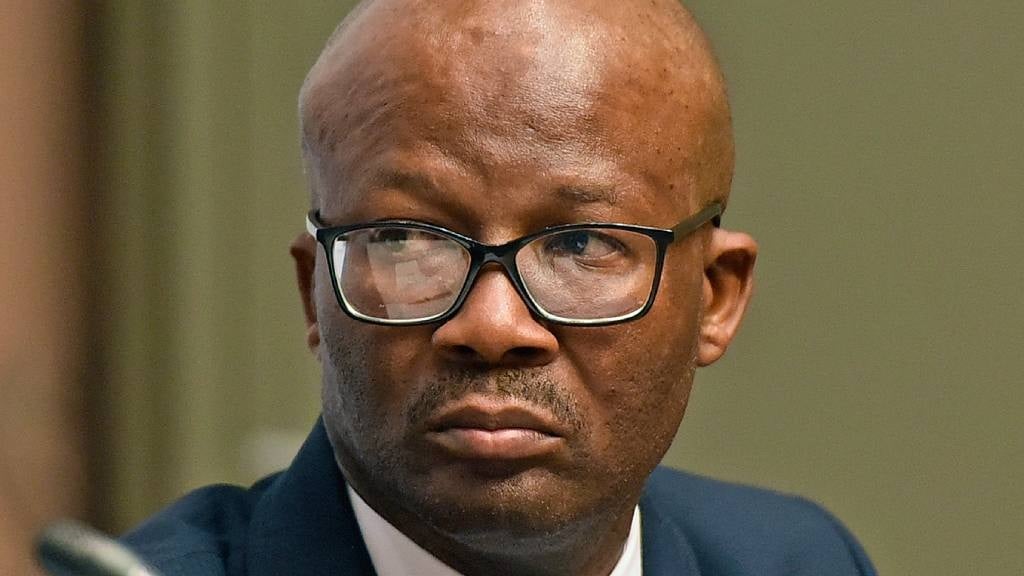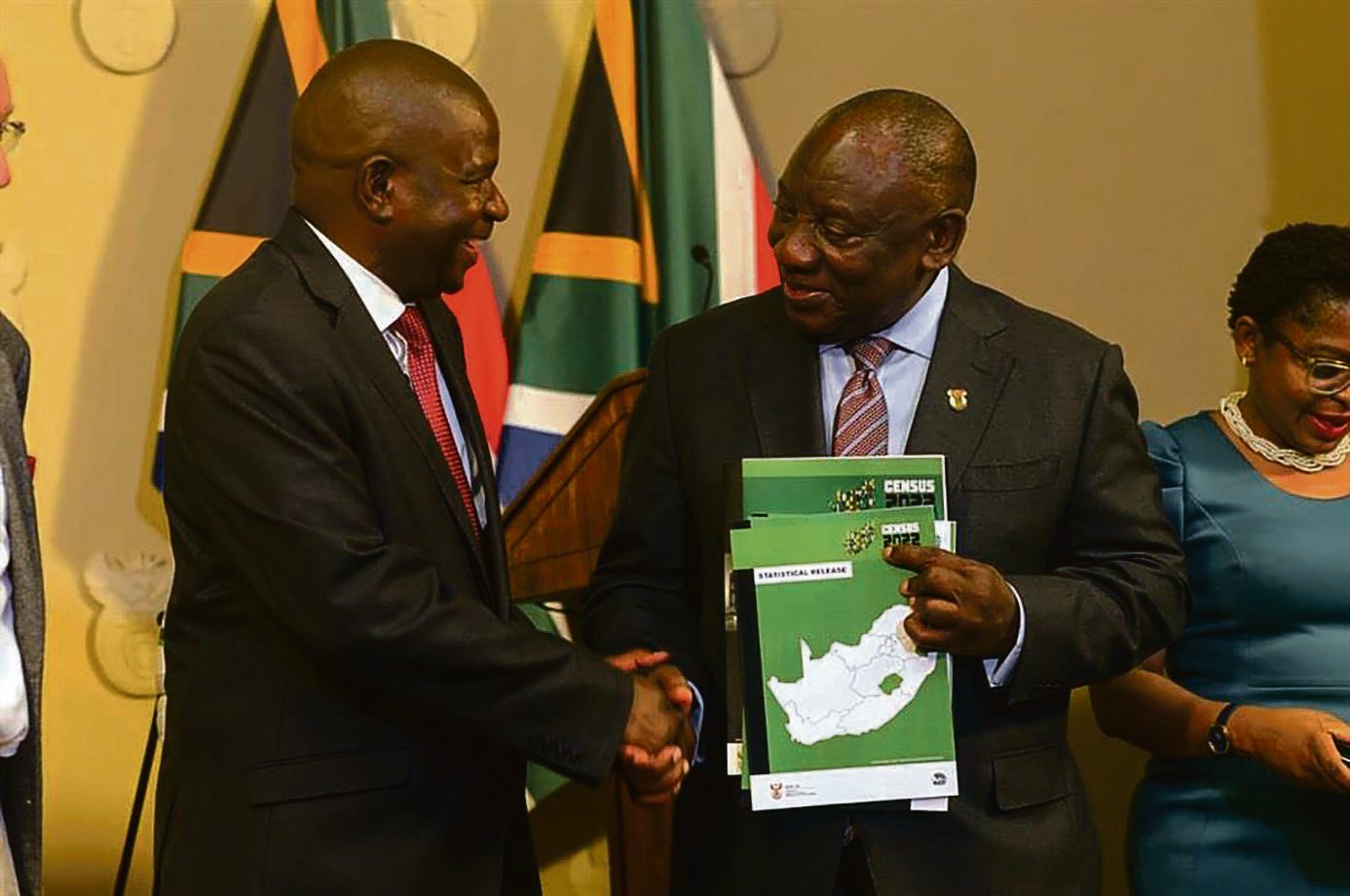
Here is where the timeline gets important.
Forensic banking records show a second payment to Baphilile, this time for the touted R1 million, being made on 22 February 2018.
An annexure to Matodzi’s affidavit, however, seems to show the payment being made on 5 February – a contradiction that is hard to explain since both dates are seemingly system-generated.
The investigators’ date (22 February), however, fits events as it came in the middle of an intense period of negotiation and pleading with both the Reserve Bank and National Treasury, this after it had become clear that VBS was teetering on the precipice and that its depositors were in danger.
On 22 February, the day the investigators’ data says the R1 million was paid, a letter had been sent to then-minister of finance Malusi Gigaba by the registrar of banks, Kuben Naidoo, wherein he raised the alarm and stated that his office “will be obliged to consider invoking appropriate actions within its mandate in order to protect depositors’ funds”.
Both Mogajane and his deputy, Ismail Momoniat, were CC’d.
(Gigaba was incidentally removed a week later in Cyril Ramaphosa’s clean-up of the Zuma Cabinet after his election as ANC president the preceding December).
On 8 March, a meeting was held at the SARB’s headquarters at the behest of Naidoo. The entire management of VBS was present and representing National Treasury was Mogajane.
On the agenda was the SARB’s intention to, later that day, recommend to newly appointed Finance Minister Nhlanhla Nene that he put VBS under curatorship. VBS was broke and no one denied it.
However, Matodzi begged to be given one more day as the Public Investment Corporation’s (PIC) investment committee was supposedly going to be meeting the next day to decide whether to grant VBS an astonishingly generous lifeline of R1.5 billion.
Mogajane was very much in VBS’ corner, as attested to by the minutes of the meeting:
Dondo had noted the upcoming meeting to be held by the PIC’s Investment Committee on Friday 9 March 2018, which indicated a possible commitment by the shareholder to find a viable solution to VBS’ immediate liquidity shortage. He further suggested that the recommendation to place VBS under curatorship be postponed until such time that the aforementioned meeting had taken place.
The motion carried the day, but the PIC funds did not materialise.
On 10 March, Mogajane belatedly co-signed a letter to Nene recommending that the bank be placed under curatorship. The letter had already been signed by Naidoo and Mogajane’s deputy, Momoniat, two days previously.
He made a handwritten note on the letter, reading: “Minister, I recommend that you approve the request of the registrar as the Tax Policy division has been engaging with the office of the registrar and believe your approval is in the best interest of depositors and to try and save the bank.”
Ultimately, if Mogajane was bribed, it did not achieve much for VBS and there is little evidence that he made strenuous efforts on the corrupt bank’s behalf.
In a statement released last week, Mogajane counter-attacked, saying: “I was one of the people who stopped Matodzi in his tracks.”
He does not deny the private meetings with Matodzi, but rather complains that “Matodzi’s affidavit conveniently excludes the many meetings held in the presence of other people, including with VBS management, the Public Investment Corporation (PIC), as a VBS shareholder, the South African Reserve Bank (SARB) and other Treasury representatives.”
Matodzi’s affidavit does, in fact, only mention two such formal meetings.
“I categorically deny that I have ever received corrupt monies or bribes… my record is clean in terms of how I ran my department and conducted myself as a member of National Treasury,” said Mogajane.
Treasury, for its part, has said in its own statement that the allegations have not yet been tested in court.
However, Mogajane’s first meeting with Matodzi at the cigar bar, if it indeed took place on 23 September 2017, would have occurred just over a month after VBS took Treasury to court, making the private meeting arguably highly inappropriate.
Mogajane’s lawyers told us: “Our client stands by the contents of the public statement he issued last week. He denies any impropriety in his dealings with VBS Bank and/or Mr Matodzi.”
The lawyer added:
Our client is unfortunately constrained in providing detailed answers to your questions since he is cooperating with the Hawks in their investigations into matters linked to VBS and would not want to prejudice such investigations.
“Should the opportunity arise, our client will be more than happy to clarify the matters raised by you in your letter.”
Dr Dan
Matodzi’s affidavit also shed light on a variety of lingering questions around VBS.
The PIC was central to the entire saga. It was not only a shareholder, but also the primary funder of VBS through debt facilities and share subscriptions.
The state-owned asset manager’s two deployees on the VBS board – Ernest Nesane and Paul Magula – were central to the fraud and were paid well for their trouble.
A forensic investigation conducted by the PIC in the aftermath of VBS’ collapse found that at least three other PIC officials had a hand in deals with the bank, while also taking loans from it.
But there was always a question mark over Dan Matjila, the then-CEO of the PIC, who has since disappeared into a fog of notoriety after having intervened to secure Iqbal Survé’s Ayo Technology Solutions a R4.3 billion PIC investment.
Matjila had received a R2.4 million home loan from VBS, which itself could not be said to constitute a bribe.
By far the most serious allegation, however, related to R5 million in physical cash that Matodzi had allegedly personally delivered to a representative of the PIC.
VBS’ treasurer, Phophi Mukhodobwane, had testified at the Mpati Commission of Inquiry, held in the aftermath of VBS’s demise, that he had withdrawn the cash at VBS’ Makhado branch, after which he had flown to Lanseria Airport in the company helicopter to give it to Matodzi, who was in turn to give it to “Dr Dan”, as Matjila is commonly known.
Banking data shows that the sum was, in fact, withdrawn on the relevant day and the teller blew the whistle to one of VBS’ founders, Madambi Muvhulawa.
Muvhulawa, in turn, alerted the PIC’s compromised VBS representative, Nesane, he claims.
Now Matodzi, in his affidavit, has revealed that he had personally given the bag of money to none other than the same Nesane in order to “take care of certain influential people within PIC”, which Matodzi says Nesane assured him “several times” included Matjila.
The practicalities again recall a pulp novel, with Matodzi claiming he stashed the money in his car and then handed it over to Nesane the next day at an Engen garage. The day after, a facility VBS had been hoping for from the PIC was granted.
Matjila has previously denied under oath that he took a bribe to help bail out VBS
“The mere suggestion that I would accept a bribe is abhorrent to me,” he told the Mpati Commission.
Molepo
Matodzi said in his affidavit that, around the critical early 2018 period, he received messages that his team managed to obtain a life-saving investment of R1 billion from Prasa, but this never materialised.
He said that high-profile ANC member and VBS fixer Kabelo Matsepe had organised a meeting between himself and Cromet Molepo (then Prasa acting CEO) at Matodzi’s residence in Eagle Canyon on 19 January 2018.
At this meeting Cromet promised Prasa to invest at least R5 billion in VBS in return for a R50 million gratification which was to be transferred to a foreign bank in Canada. No banking details were provided at the meeting or subsequent thereto. At the conclusion of the meeting, he then requested that I write to Prasa regarding the VBS investment proposal. I wrote a letter and sent it to him. I do not recall any further engagements with Cromet after our meeting as the relationship was being handled by Matsepe. The promised investment did not materialise, and no gratifications were paid.
While Molepo confirmed to amaBhungane that he had attended a meeting at Matodzi’s house, he vehemently denied Matodzi’s claim that he had requested a R50 million bribe or that he had promised to increase Prasa’s investment in VBS to R5 billion.
Molepo, who was appointed as acting CEO in the second week of December 2017, said he had a lot of meetings with various individuals at that time and does not remember who invited him to the meeting with Matodzi and Matsepe.
“I did not know that it was a [meeting with] a service provider. I was just asked to come meet ‘someone who had something to discus with me’.”
It was only when he arrived at Matodzi’s house that he learned he was meeting with VBS representatives over Prasa’s pending investment with the mutual bank.
In November 2017, Molepo’s predecessor, Lindikhaya Zide, wrote a letter to VBS, saying that Prasa would deposit R1 billion in VBS for a guaranteed interest rate of 8.5% per annum.
At the 2018 meeting, Molepo said Matodzi and Matsepe “confronted” him with that letter and accused him of being a “stumbling block” to the investment that Zide had already approved.
Responding to the allegation that he had promised to increase the investment to R5 billion in exchange for a R50 million bribe that had to be paid into a foreign account in Canada, Molepe said this was a “blue lie”.
He confirmed that his wife and children were based in Canada at the time and that this “was not a secret”, noting that any suggestion that the money would be sent to accounts held by them was false.
Mpumelelo Mkhabela | VBS ‘parasitic looting’: The day the SACP committed ideological suicide
On 24 January 2018, VBS addressed a letter to Molepo, recording that after a “fruitful and constructive” meeting between Molepo and Matodzi, VBS had now approved an increased interest rate of 9.25%.
Molepo told amaBhungane that he never gave anyone a directive to make an investment in VBS, but documents from Motau’s initial report on VBS show that on the same day, Molepo forwarded VBS’ letter to the acting CFO Yvonne Page, stating that he had “negotiated an improvement on the original proposal which [Prasa] had accepted” and “because of the strategic nature of the proposal in terms of transformation, kindly prepare a submission for approval by the nominee of the BOC”.
According to Motau: “Page did not do as Molepo had directed. Instead she wrote back to him, saying: ‘Please note where we are at the moment the investment cannot be made – as discussed, we will give you a full write up.'”
She then informed Treasury of the situation. The affair subsequently became public knowledge and Prasa did not proceed any further in the ensuing glare of publicity.
Internal documents show that, in December 2017, shortly after Molepo was appointed as acting CEO, Page submitted the finance department’s risk analysis, explaining that investing in VBS would be unlawful and too risky.
Therefore, by the time that Molepo met with Matodzi in 2018 and informed Page to make a submission to the board, including the newly “negotiated” interest rate, he was well aware of the issues around the VBS investment.
You be the judge: Internal Prasa communication about the VBS investment:





Recent Comments